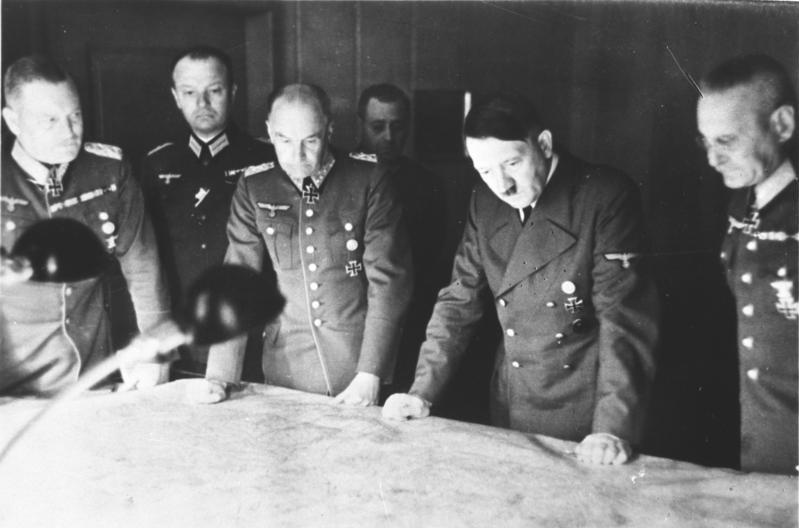During the Third Riech, Hitler fortified his leadership atop bastions of war, invasion and politics. One of them though dared to traipse across party lines and contribute to both Nazi propoganda and the downfall of Hitler. Franz Halder played an instrumental piece in the working of the German Wehrmacht, but was also awarded accolades by the President of the United States. He served as chief of Hitler’s army general staff from 1938 to 1942. During this time, he oversaw the victorious takeovers of Poland, France, Denmark, Norway and the Balkans. However, he achieved all this despite harbouring dissent towards Hitler’s extreme position in the domestic and international arena.

Getting to Know a Warring Genius
Franz Halder was born in Würzburg to a military family with ties to the Bavarian family from the 17th century. His own career began in the Third Field Artillery Regiment of the Royal Bavarian Army. By the end of the first World War, Halder began receiving his staff assignments. He was leading his first command post by October 1934 and from there began to glide up the army ranks. By 1936, lieutenant general Halder was appointed as the Chief of the Oberkommando des Heeres General Staff in Hitler’s Third Reich Army. During this time, Halder was a man of vacillating ideologies. On the one hand, he supported Hitler and offered no objections to the Holocaust murders. On the other hand, he refused to accept Hitler’s extremist tactics. All this while, he had remained a verbose carper of the Gestapo. In fact, had he even planned Hitler’s overthrow with his predecessor Ludwig Beck, who had previously resigned from the post in disagreement with the leader. This daring opposition, and others that followed, would later herald Halder’s own pardon in a strange turn of events.
Halder’s shaky loyalties prompted him to maintain a meticulous diary of everything he encountered as the chief of staff. The senior ranker played a key role in developing plans for besieging neighbouring countries, including the invasion of Poland in 1939. Soon achieved his highest rank as the colonel-general in the army. All the developments, along with the day-to-day happenings within the organisation, went into Frank’s notes.

Hitler at the headquarters of the Commander-in-Chief of the Army.
Soon, Hitler was announcing a disastrous offensive on France, which drew Halder and his contemporaries into a new plan for his assassination. But the general got cold feet, and a series of successful offensives strengthened Hitler’s position. Halder’s own career began taking hits as well. Of the view that the troops would take over Moscow before the winter of 1941, he faltered in provisioning food and distributions for cold weather. The takeover drew out longer than expected, and thousands of soldiers were lost to the wrath of the season. This marked the end of Haalder’s career as Chief of Staff.
During his retirement, Franz was implicated in the third failed assassination of Hitler, which occured in 1944. Days of merry were gone, and the once revered army man was sent off to a concentration camp at Flossenburg. But by the end of the war in 1945, he and other high ranking officials were liberated by the Allied Forces as troops marched into the camps of infamy.
Knowledge is power, and unlike hundreds of others, he was able to flee execution owing to his access to sensitive information and his commonly known opposition of the Nazi propoganda. In July 1946, former General Halder testified at the IMT Nuremberg commission hearings, where he revealed the hattrick of unsuccessful assassinations against Hitler. From 1947 to 1961 he worked extensively with the US military. His diary came into play as an integral piece of evidence in shaping Nazi doctrine and German military history. It was also brought on record during the Allies’ prosecution of Hitler’s high command at the High Command Trial. The tables had turned, and now one of Hitler’s closest accomplices was aiding the US Historical Division. Under him, 700 German officers were tasked with preparing some 2,500 documents of historical data. For his paramount contributions, Franz Halder was awarded the US Meritorious Civilian Service Award in 1961 by President John F Kennedy, becoming the only German ever to be decorated both by Hitler and by an American president. The clement attitude towards the general coloured his name with valour for generations to come. The Halder Diaries, which were made public in 1976, continue to serve intelligence and historical study even after the general’s death.
References
# Nytimes.com
# Britannica.com












Comments
Post a Comment